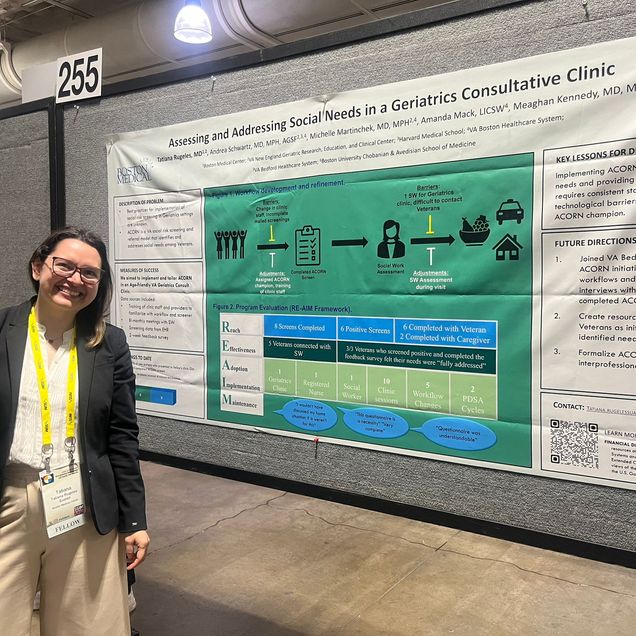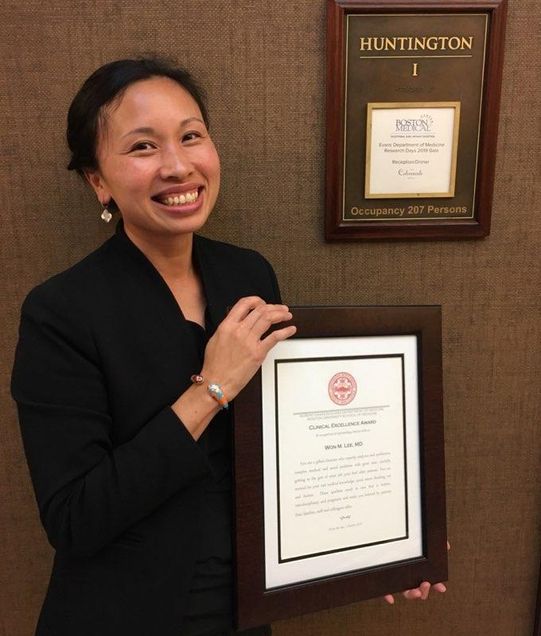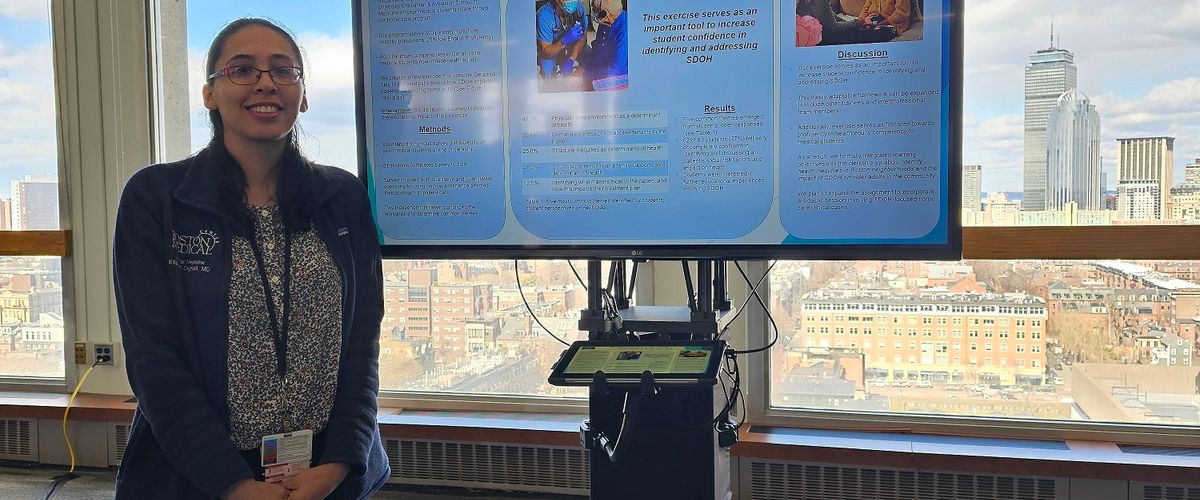Educational Didactics
Fellows are introduced to a wide array of both geriatric and career related topics throughout the year-long didactic curriculum. Fellows have a month-long orientation experience in July that includes core topics in Geriatrics as well as topics to help adapt to a new system of care, including introductions to the various clinical sites of practice, prioritization with complex patients, and personal time management strategies. Our innovative Center of Excellence Curriculum as well as small group, high-yield geriatric topics are woven throughout the year to ensure fellows build a strong foundation in skills as clinicians, leaders, and educators. Our Works in Progress curriculum is a year-long series to help fellows with projects and is for general guidance in their scholarship.
| Didactic Experience | Example Topics (not inclusive of entire curriculum) |
| Orientation |
|
| Center of Excellence |
|
| Small group, high-yield geriatric content |
|
| Works in Progress |
|
National Collaboration: GERI-A-FLOAT
BU Geriatrics Fellowship Program is a proud partner in the GERI-A-FLOAT (GERIatrics Fellows Learning Online And Together) national collaboration with Dr. Ryan Chippendale serving as a co-founder and co-director of the platform. As a response to the COVID-19 pandemic’s challenges to fellows’ educational opportunities and well-being, geriatrics fellowship program directors from across the country partnered to develop this twice-monthly virtual educational & networking series for geriatrics fellows.
The goals of the the GERI-A-FLOAT series are as follows:
- To deepen knowledge of topics related to geriatric medicine through shared online learning between fellowship programs
- To combat the social isolation and mental health effects of the COVID-19 pandemic in fellows through networking and peer support.
- To access past and future GERI-A-FLOAT sessions, visit the Geri-a-FLOAT website:
Research Experience
There are a wide variety of clinical, educational and quality improvement related research projects that fellows can become involved with at Boston University and within our section of Geriatrics. Highlights of some of the ongoing research projects by our faculty members can be found here.

Teaching Opportunities & Educational Scholarship
Fellows have the opportunity to perform clinical teaching to a variety of different learners during their block and longitudinal experiences. Our Centers of Excellence Module on Clinical Teaching ensures the development of core skills as a geriatrics educator along with the following mentored teaching experiences:
- Fellows serve as preceptors to 4th year medical students rotating through their required geriatrics rotation in the home care program. Students join fellows on home visits twice monthly, where fellows have the opportunity to teach and assess students’ clinical skills. A curriculum dedicated to skill development in the area of precepting medical students is facilitated by Clerkship Director Dr. Megan Young during orientation.
- Fellows also serve as a core educator to 3rd year medical students, Physician Assistant students, Subinterns, and Internal Medicine interns and residents during their Geriatrics Inpatient Service rotations. Alongside the Geriatrics Inpatient Service attending physician, fellows provide bedside teaching, attending rounds of core geriatric topics and “on the fly” teaching and coaching of all learners on the team.
- Fellows have opportunities to teach other learners such as medical and physician assistant students & family medicine residents while on rotation at our VA affiliated sites.
- Fellows also have additional opportunities to refine their teaching skills through presenting Morbidity & Mortality conferences, Journal Clubs and other topics of interest during Geriatrics Grand Rounds both at Boston University and VA sites.
- If interested, fellows have the opportunity to create, facilitate and disseminate innovative educational experiences for the various learners we work with as part of their fellowship experiences. Some recent examples are as follows:
- Dr. Shivani Jindal assisted in creating and studying a “Social Calls” program for socially isolated older adults during the time of COVID utilizing the expertise of 4th year medical students on their required geriatrics clerkship under the mentorship of Dr. Megan Young:
https://icollaborative.aamc.org/collection/covid-19-student-service-projects/ - Dr. Emily Cetrone evaluated and disseminated the home care educational experience for medical students under the mentorship of Dr. Megan Young in the Journal of American Geriatrics Society:
- Dr. Nicole Mushero created, facilitated and evaluated a curriculum on dysphagia in older adults with dementia for Internal Medicine Primary Care residents which was disseminated in Med Ed Portal under the mentorship of Dr. Ryan Chippendale: https://pubmed.ncbi.nlm.nih.gov/35309254/
- Dr. Sarah Phillips created, facilitated and evaluated a curriculum on the 4Ms that was given to Internal Medicine residents with their continuity clinic at VA Boston which was published in Med Ed Portal under the mentorship of Dr. Andrea Schwartz of the VA GRECC 2nd year fellowship program.
- Dr. Shivani Jindal assisted in creating and studying a “Social Calls” program for socially isolated older adults during the time of COVID utilizing the expertise of 4th year medical students on their required geriatrics clerkship under the mentorship of Dr. Megan Young:
Mentorship
Early establishment of mentorship in all domains of geriatrics practice is a pillar of our program. We strongly believe that this translates to success in pursuing individual interests during fellowship and when transitioning to new career paths after training.
- As a unique aspect of our fellowship experience, each fellow is paired 1:1 with clinical preceptors in all longitudinal sites of care (Home Care, Clinic, Nursing
 Home) who serve as mentors in each respective clinical area.
Home) who serve as mentors in each respective clinical area. - Additionally, fellows are scheduled to meet with Program and Section leadership (Drs. Chippendale, Vovnoboy and Day) during orientation to explore individual scholarship, research, clinical and/or administrative interests. This allows our team to match fellows with mentors in areas of interest early to ensure academic interests and pursuits are explored fully during fellowship.
- During orientation, we also hold “mentorship lunches” with various faculty who have active ongoing scholarly projects that fellows can join if interested.
- As part of our educational curriculum, we hold monthly “Works In Progress” sessions, led by Core Faculty member and outstanding geriatrics researcher, Dr. Stacy Andersen PhD, to ensure additional mentorship for ongoing research, education or QI projects.
- With the combination of all these supports, we have a 100% success rate in our fellows presenting abstracts at the national American Geriatrics Society conference each year, in addition to presenting at other local, regional and national conferences.
